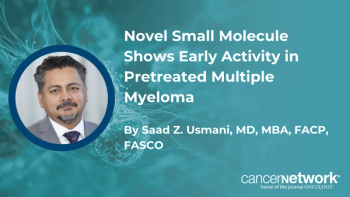
FDA Delays Decision of Tislelizumab Monotherapy for Previously Treated Unresectable Advanced or Metastatic ESCC
The FDA has delayed the decision to approve tislelizumab monotherapy for patients with advanced or metastatic esophageal squamous cell carcinoma following prior systemic therapy, due to COVID-19 travel restrictions.
Approval for single-agent tislelizumab in the second line or later for patients with advanced or metastatic esophageal squamous cell carcinoma has been delayed by the FDA, as site inspections could not be concluded due to COVID-19 travel restrictions in China, according to a press release from BeiGene.1
The FDA will continue to review the application, but no new action date has been announced as of yet. However, the travel restrictions and public health situation will continue to be monitored by the agent’s developers and the regulatory organization.
“We are working with our partner, Novartis, to facilitate the required inspections and bring tislelizumab to patients with second-line esophageal cancer in the U.S. following regulatory approval,” John V. Oyler, co-founder, chairman, and chief executive officer of BeiGene, said in the press release.
Results from the phase 3 RATIONALE 302 trial (NCT03430843) demonstrated a statistically significant overall survival benefit of tislelizumab vs chemotherapy in the second-line setting for advanced esophageal squamous cell carcinoma.2 Data were previously presented at the
A total of 512 patients were enrolled in the trial from 132 sites across 10 countries. Patients were randomized to either the tislelizumab arm (n = 256) or investigator’s choice chemotherapy (n = 256). Patients were given 200 mg of tislelizumab intravenously every 3 weeks or investigator choice chemotherapy until disease progression, unacceptable toxicity, or withdrawal.
At data cutoff, the median follow-up was 8.5 months in the tislelizumab arm and 5.8 months in the chemotherapy arm. The primary end point of overall survival (OS) in the intention to treat population was met, with medians of 8.6 months in the tislelizumab arm and 6.3 months in the chemotherapy arm (HR, 0.70; 95% CI, 0.57-0.85; P = .0001). In the tislelizumab arm, the objective response rate was 20.3% vs 9.8% in the chemotherapy arm, with the median duration of response being 7.1 months vs 4.0 months, respectively (HR, 0.42; 95% CI, 0.23-0.75).
Patients with PD-L1 expression of 10% or greater by visually estimated combined positive score who received tislelizumab had improved median OS at 10.3 months compared with 6.8 months in the chemotherapy arm (HR, 0.54; 95% CI, 0.36-0.79; P = .0006).
Grade 3 or higher adverse effects (AEs) that were treatment-related occurred less frequently in the tislelizumab arm at 19% vs 56% in the chemotherapy arm. Discontinuation due to treatment-related AEs occurred in 7% of patients in the tislelizumab arm compared with 14% in the chemotherapy arm.
Eligibility criteria included having histologically confirmed esophageal squamous cell carcinoma, progression during or after first-line treatment, at least 1 measurable lesion, ECOG performance status of 0 or 1, and adequate organ function.
Exclusion criteria included having 2 or more prior systemic treatments, previous gastrointestinal perforation or a fistula within 6 months of randomization, uncontrolled pleural effusion, and prior therapies that target PD-1 or PD-L1.
References
- BeiGene provides regulatory update on the U.S. biologics license application (BLA) for PD-1 inhibitor tislelizumab in 2L ESCC. News Release. BeiGene. July 14, 2022. Accessed July 14, 2022. https://bit.ly/3P9gFhU
- Shen L, Kato K, Kim SB, et al. RATIONALE 302: Randomized, phase 3 study of tislelizumab versus chemotherapy as second-line treatment for advanced unresectable/metastatic esophageal squamous cell carcinoma. J Clin Oncol. 2021;39(suppl 15):4012-4012. doi: 10.1200/JCO.2021.39.15_suppl.4012
Newsletter
Stay up to date on recent advances in the multidisciplinary approach to cancer.












































